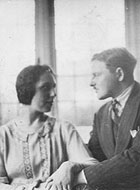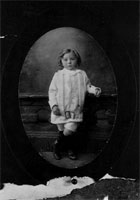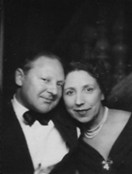When she was very old, and had forgotten nearly everything, there were a few memories that my grandmother clung to, disparate dots that she struggled to join up to keep hold of the life that she was losing. One that she kept almost to the end was the fact that the chandelier in my parents’ suburban front  room had belonged to her mother, my great-grandmother, who was born in Poland and brought up her children in a London slum. Every time she saw that chandelier, my grandmother would stop, stare and remember. Then in the cockney accent that re-emerged in her old age, finally overcoming the effects of the elocution lessons my grandfather had sent her to after the war, she would say, ‘That was my mummy’s, you know.’ She would repeat this statement several times, with a mixture of pride and, still, astonishment at this unlikely provenance.
room had belonged to her mother, my great-grandmother, who was born in Poland and brought up her children in a London slum. Every time she saw that chandelier, my grandmother would stop, stare and remember. Then in the cockney accent that re-emerged in her old age, finally overcoming the effects of the elocution lessons my grandfather had sent her to after the war, she would say, ‘That was my mummy’s, you know.’ She would repeat this statement several times, with a mixture of pride and, still, astonishment at this unlikely provenance.
But most of her imperishable memories concerned Henry, her husband and my grandfather, and they were mainly from the tough but happy times before they were married. She told anyone who would listen about how, on the night they met in Spitalfields in 1929, when he was a barrow boy and she was a milliner’s apprentice, Henry had danced all the way home, and the idea of him leapfrogging fire hydrants, dodging horses and twirling around lamp-posts would always make her beam. She had forgotten all the garden parties and glitzy balls that they eventually went to, but she remembered what she ate on their early dates in the West End, which, to them, was then both enemy  territory and a sort of promised land. She would croak the refrains of inter-war ballads (especially ‘If You Were the Only Girl in the World’), which had lodged in her fraying mind, in the way that song lyrics can, for over seventy years. My brother and I visited her in hospital when she no longer knew who we were, and she grabbed and stroked the red hair my brother has inherited from his grandfather as if he were Henry’s ghost.
territory and a sort of promised land. She would croak the refrains of inter-war ballads (especially ‘If You Were the Only Girl in the World’), which had lodged in her fraying mind, in the way that song lyrics can, for over seventy years. My brother and I visited her in hospital when she no longer knew who we were, and she grabbed and stroked the red hair my brother has inherited from his grandfather as if he were Henry’s ghost.
As tends to happen, while I had the chance I didn’t ask my grandmother as much as I wish I had about her childhood, her courtship, her war, her husband and her life. Then when it was too late I wanted to know where she and Henry had come from, and how they had got from there to where they ended up. I was lucky. It turned out that Henry, who died too early for me to have known him properly when he was alive, had written copiously and kept everything: letters, diaries, photographs, address books, invitations, business ledgers and notes scribbled to himself on the backs of envelopes. So he left a musty record of how, with my grandmother, he escaped the poverty of his own immigrant’s childhood; how he became an Englishman; and how he met the more commonplace challenges of love, friendship and ambition.
Looked at in one way, Henry’s life was, like most lives, inconsequential, unfolding as it did on the margins of mass migrations, world wars and social upheavals. He fought in no famous battles, held no high office and was never quite successful enough in business to make headlines. Considered in another, closer way, it was, like most lives, extraordinary. It was harder and richer, both more foreign and more English than I had known – and the England it was lived in was a subtler and more fluid place than it is often thought to be.
Henry and Miriam, my grandmother, grew up in conditions that are still a living memory, but one that already seems scarcely credible. Their story spans three little worlds that have now all but vanished: the Jewish communities of Russian Poland and Galicia that their families came from; the immigrant Jewish colony that once occupied a part of London’s East End; and the last encore of British high society in which, after the war, my grandparents played unlikely cameos. Henry almost died during the Blitz. But soon after he emerged from the chrysalis of his bandages he befriended a bona fide gentleman named Walter Sherman, who was drifting gently downwards in the world as Henry was clawing his way up. Their friendship – documented in correspondence that is, I discovered, as tender and intimate in its way as Henry’s love letters to Miriam – revised my grandfather’s ideas about what his life could become.
cameos. Henry almost died during the Blitz. But soon after he emerged from the chrysalis of his bandages he befriended a bona fide gentleman named Walter Sherman, who was drifting gently downwards in the world as Henry was clawing his way up. Their friendship – documented in correspondence that is, I discovered, as tender and intimate in its way as Henry’s love letters to Miriam – revised my grandfather’s ideas about what his life could become.
Soon after he and Walter met, Henry was frequenting the gentlemen’s clubs of Pall Mall, where footmen boiled the coins and ironed the newspapers. In place of the chancers and sharks of his early acquaintance, he and Miriam, with her newly polished accent, would hobnob and do-good with aristocrats, American heiresses and the wives of prime ministers. They penetrated the rarefied scene of coming-out parties, presentations at Court and the London Season, just as the version of England that such diversions embodied was finally expiring. Instead of drinking lemon tea through a lump of sugar clenched between his front teeth, in the Russian style he had learned from his father, Henry would sip his coffee through cream as the English did. His conventional aspiration for a better life than his parents had managed was superseded by more extravagant quests. He would strive to become Lord Mayor of London; he would shake the hands of monarchs and pursue impossible proofs of gentility. He would exchange his immigrant’s legacy for the birthright of a true-born English- man. His less metamorphic siblings called him, half-mockingly, but half in admiration, the Earl of Hertfordshire.
This is not a story about the stoicism of poverty. The lives I have tried to put back together – Henry’s, and my grandmother’s life in his shadow – show what ingenuity and audacity and determination can do, even  at a time when every dropped ‘h’ is supposed to have betrayed a person’s origins and predetermined his fate. In the end, though, Henry and Miriam’s story is also about the limits of what pluck and perseverance can achieve, and what they can transform. Henry was perpetually reminded of those limits by his mother-in-law and my great-grandmother, Leah Claret, a woman with an enigmatic, heroic, tragic story of her own, and a secret cache of letters that help to tell it. Walter Sherman was Henry’s guide to the new world he set out to conquer; Leah Claret, seamstress and aficionado of chandeliers, was a breathing memento of the old world and Henry’s old self, both of them incarnate and incessant in her uncompromising, big-boned flesh.
at a time when every dropped ‘h’ is supposed to have betrayed a person’s origins and predetermined his fate. In the end, though, Henry and Miriam’s story is also about the limits of what pluck and perseverance can achieve, and what they can transform. Henry was perpetually reminded of those limits by his mother-in-law and my great-grandmother, Leah Claret, a woman with an enigmatic, heroic, tragic story of her own, and a secret cache of letters that help to tell it. Walter Sherman was Henry’s guide to the new world he set out to conquer; Leah Claret, seamstress and aficionado of chandeliers, was a breathing memento of the old world and Henry’s old self, both of them incarnate and incessant in her uncompromising, big-boned flesh.